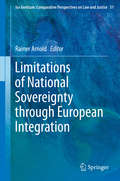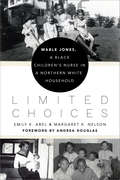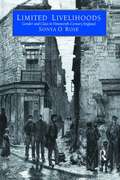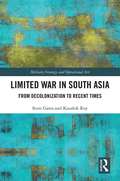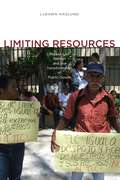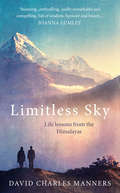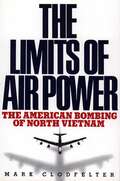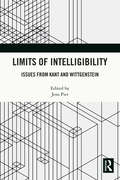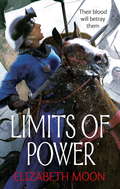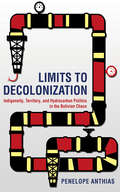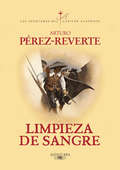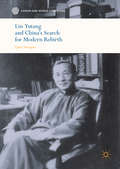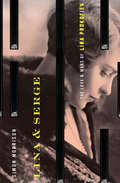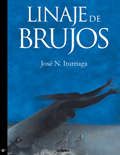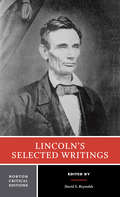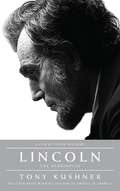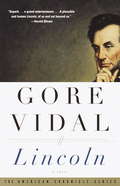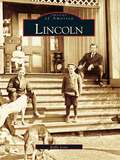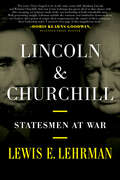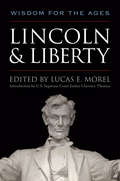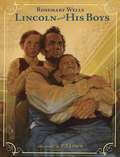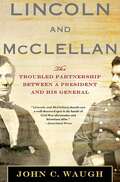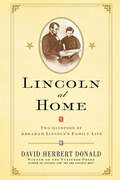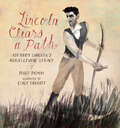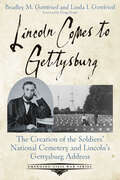- Table View
- List View
Limitations of National Sovereignty through European Integration
by Rainer ArnoldThe book considers the changes which national sovereignty has undergone through the supranational European integration. In various contributions by renowned academics and high judges demonstrate the serious impacts of supranationality on the EU member states and even on third countries which are connected with the EU by international treaties. It becomes clear that primacy of EU law, the most significant expression of supra-nationality, collides with national sovereignty as anchored in the national constitutions. The studies clearly show that most member states do not fully deny EU law primacy but are aware of the need to find an adequate balance between the supranational and the national orders. The result from the analyses of the authors from various European countries is that the upcoming constitutional paradigm is "constitutional identity", a concept established by jurisprudence in Germany, France, Czech Republic (without being named so) and debated also in Poland which, herself, denies supranational impact on the national Constitution entirely. Studies on selected EU member states clarify the specific national approaches towards the limitations of their sovereignty as developed by the constitutional jurisprudence (Poland, Czech Republic, Hungary, Romania, Italy, Germany with comparative references to United Kingdom and France). It is illuminated that traditionally strong sovereignty concepts (UK, France) are considerably relativized and functionally opened towards the integration challenges. Basic issues are furthermore reflected, such as the supranational impact on the State's power to reform its Constitution, the relation of national and constitutional identity and the national and supranational perspectives of identity. The book also includes Europe beyond the EU by research on the supranational character of association treaties (from a Ukrainian perspective) and on the Europeanization of a third country preparing EU membership (Albania).
Limited Choices: Mable Jones, a Black Children's Nurse in a Northern White Household
by Emily K. Abel Margaret K. NelsonWhen interviewed by the Charlottesville, Virginia, Ridge Street Oral History Project, which documented the lives of Black residents in the 1990s, Mable Jones described herself as a children’s nurse, recounting her employment in New York City in the 1940s and 1950s. Emily Abel and Margaret Nelson, whose mother employed Jones, use the interview and their own childhood memories as a starting point in piecing together Jones’s life in an effort to investigate the impact of structural racism, and a discriminatory system their family helped uphold. The book is situated in three different settings—the poor rural South, Charlottesville, and the affluent suburb of Larchmont, New York—all places that Mable Jones lived and worked.Mable Jones was emblematic of her race, gender, time, and place. Like many African Americans born around 1900, she lived first in a rural community before moving to a city. She had to leave school after the eighth grade and worked until a year before her death. And her occupation was that held by the majority of African American women through the twentieth century. Reflecting on her life, local civil rights leader Eugene Williams asked the authors to document the "segregation in Charlottesville that Mrs. Jones endured." This book honors his charge by highlighting the limited choices available to her. It documents the slow progress of change for many African Americans in the South, explores the still little-known experiences of Black household workers in the suburban North, and reconstructs the textured lives that Mable Jones and the many women like her nevertheless carved out in a system that was and continues to be stacked against them.
Limited Livelihoods: Gender and Class in Nineteenth Century England (Studies On The History Of Society And Culture Ser. #13)
by Sonya O. RoseFirst published in 2004. Routledge is an imprint of Taylor & Francis, an informa company.
Limited War in South Asia: From Decolonization to Recent Times (Military Strategy and Operational Art)
by Kaushik Roy Scott GatesThis book examines the origins, courses and consequences of conventional wars in post-colonial South Asia. Although South Asia has experienced large-scale conventional warfare on several occasions since the end of World War II, there is an almost total neglect of analysis of conventional warfare in the Indian subcontinent. Focusing on China, India and Pakistan, this volume, therefore, takes a unique approach. Regional rivalries between India and Pakistan are linked with global rivalries between the US and USSR (later Russia) and then China, and war is defined in a broader perspective. The book analyses the conduct of land, sea and air warfare, as well as the causes and consequences of conflicts. Tactical conduct of warfare (the nature of mobile armoured strikes and static linear infantry combat supported by heavy artillery) and generalship are studied along with military strategy, doctrine and grand strategy (national security policy), which is an amalgam of diplomacy, military strategy and economic policy. While following a realpolitik approach, this book blends the development of military strategies and doctrines with the religious and cultural ethos of the subcontinent’s inhabitants. Drawing on sources not easily accessible to Western scholars, the overall argument put forward by this work is that conventional warfare has been limited in South Asia from the very beginning for reasons both cultural and realpolitik. This book will be of much interest to students of South Asian politics, security studies, war and conflict studies, military studies and International Relations in general.
Limiting Resources: Market-Led Reform and the Transformation of Public Goods (G - Reference, Information and Interdisciplinary Subjects)
by LaDawn HaglundThe provision of public goods such as education, electricity, health, sanitation, and water used to be regarded as primarily the responsibility of governments, but in the 1980s privatization of such services spread and reliance on market mechanisms instead of governments became common in many parts of the world, including developing countries. The record of the past twenty-five years of market-led development, however, has not been encouraging. Not only has it failed to improve public services significantly, but it has also undermined democratic institutions and processes, reproduced authoritarian relations of power, and suppressed alternatives made possible by an increasing global acceptance of the importance of economic and social rights. In Limiting Resources, LaDawn Haglund seeks an understanding of public goods that can better serve the needs of people in developing countries today.Haglund critiques the narrow conception of public goods used in economics, which tends to limit the range of resources considered “public,” and proposes an expanded conception drawing from multiple disciplines that incorporates issues of justice, inclusion, and sustainability. She then uses case studies of electricity and water provision in Central America to illuminate the conditions for success and the causes of failure in constructing adequate mechanisms for the supply of public goods. She follows with an analysis of political conflicts over privatization that reveals how neoliberal policies have made effective state action difficult. The book concludes with suggestions for ways in which this reformulated conception of public goods can be applied to promote justice, sustainability, and economic and social rights in developing countries.
Limitless Sky: Life lessons from the Himalayas
by David Charles MannersThis is the remarkable true story of a young man's initiation in the Himalayas. David Manners was trekking in Nepal when he stumbled upon the mountain home of a jhankri, or Nepalese shaman. The jhankri accepted David as his pupil, and so began the next stage of David's extraordinary journey, in which he embarked upon an adventure that was more challenging and, ultimately, life-affirming than anything he could have imagined. In Limitless Sky, David shares the wisdom and insights he learnt from those transformational days in the Himalayas. These include practical guidance on how to live a full and fearless life, how to find happiness and how to live in ways that nurture both ourselves and others. As David reveals, the life lessons he learned amongst the mountains of the Himalayas could benefit us all today.
Limits of Air Power: The American Bombing of North Vietnam
by Mark ClodfelterTracing the use of air power in World War II and the Korean War, Mark Clodfelter explains how U. S. Air Force doctrine evolved through the American experience in these conventional wars only to be thwarted in the context of a limited guerrilla struggle in Vietnam. Although a faith in bombing's sheer destructive power led air commanders to believe that extensive air assaults could win the war at any time, the Vietnam experience instead showed how even intense aerial attacks may not achieve military or political objectives in a limited war. Based on findings from previously classified documents in presidential libraries and air force archives as well as on interviews with civilian and military decision makers, The Limits of Air Power argues that reliance on air campaigns as a primary instrument of warfare could not have produced lasting victory in Vietnam. This Bison Books edition includes a new chapter that provides a framework for evaluating air power effectiveness in future conflicts.
Limits of Intelligibility: Issues from Kant and Wittgenstein
by Jens PierThe essays in this volume investigate the question of where, and in what sense, the bounds of intelligible thought, knowledge, and speech are to be drawn. Is there a way in which we are limited in what we think, know, and say? And if so, does this mean that we are constrained – that there is something beyond the ken of human intelligibility of which we fall short? Or is there another way to think about these limits of intelligibility—namely as conditions of our meaning and knowing anything, beyond which there is no specifiable thing we cannot do? These issues feature prominently in the writings of Kant and Wittgenstein who each engaged with them in unique and striking ways. Their thoughts on the matter remain provocative and stimulating, and accordingly the contributions to this volume address the issues surrounding the limits of intelligibility both exegetically and systematically: they examine how they figure in Kant’s and Wittgenstein’s most significant works and put them in touch with contemporary debates that are shaped by their legacy. These debates concern, inter alia, logically and morally alien thought, the semantics and philosophy of negation, disjunctivism in philosophy of perception and ethics, paraconsistent approaches to contradiction, and the relation between art, literature, and philosophy. The book is divided into four parts: Part I gives a first assessment of the issues, Part II examines limits as they feature in Kant, Part III as they feature in Wittgenstein, and Part IV suggests some ways in which the questions might be reconsidered, drawing upon ideas in phenomenology, dialetheism, metamathematics, and the works of other influential authors. Limits of Intelligibility provides insight into a theme that is central to the thought of two of the most important figures in modern philosophy, as well as to recent metaphysics, philosophy of language, philosophy of logic, epistemology, and ethics.
Limits of Power: Paladin's Legacy: Book Four (Paladin's Legacy #4)
by Elizabeth MoonMAGIC WILL NOT BE ENOUGH The Lady of the elves has been slain and King Kieri injured by the iynisin, a corrupted race of elves whose poisonous touch means grisly death for all who stand in their way. As the Lady's elves retreat to bury their dead, strange discoveries are made in the palace, revealing old secrets about the ancient alliance between humankind and elves. Meanwhile, in the kingdom of Tsaia, young Prince Camwyn begins to exhibit dangerous signs of magery. Discovery of magical blood so close to the king will put his brother's rule in jeopardy, but he has nowhere to turn when even his own family might put him to death for treason.
Limits to Decolonization: Indigeneity, Territory, and Hydrocarbon Politics in the Bolivian Chaco (Cornell Series on Land: New Perspectives on Territory, Development, and Environment)
by Penelope AnthiasPenelope Anthias’s Limits to Decolonization addresses one of the most important issues in contemporary indigenous politics: struggles for territory. Based on the experience of thirty-six Guaraní communities in the Bolivian Chaco, Anthias reveals how two decades of indigenous mapping and land titling have failed to reverse a historical trajectory of indigenous dispossession in the Bolivian lowlands. Through an ethnographic account of the "limits" the Guaraní have encountered over the course of their territorial claim—from state boundaries to landowner opposition to hydrocarbon development—Anthias raises critical questions about the role of maps and land titles in indigenous struggles for self-determination.Anthias argues that these unresolved territorial claims are shaping the contours of an era of "post-neoliberal" politics in Bolivia. Limits to Decolonization reveals the surprising ways in which indigenous peoples are reframing their territorial projects in the context of this hydrocarbon state and drawing on their experiences of the limits of state recognition. The tensions of Bolivia’s "process of change" are revealed, as Limits to Decolonization rethinks current debates on cultural rights, resource politics, and Latin American leftist states. In sum, Anthias reveals the creative and pragmatic ways in which indigenous peoples contest and work within the limits of postcolonial rule in pursuit of their own visions of territorial autonomy.
Limpieza de sangre (Las aventuras del capitán Alatriste #Volumen 2)
by Arturo Pérez-ReverteEn esta segunda entrega de «Las aventuras del capitán Alatriste» la trama pondrá en juego la vida de los amigos del capitán, haciendo surgir del pasado los fantasmas de viejos enemigos. A punto de incorporarse a su antiguo tercio en Flandes, Diego Alatriste se ve envuelto por mediación de su amigo don Francisco de Quevedo en otra peligrosa aventura. Una mujer ha aparecido estrangulada en una silla de manos frente a la iglesia de San Ginés, con una bolsa de dinero y una nota manuscrita: «Para misas por su alma». El enigma se complica con los sucesos misteriosos que ocurren tras las paredes de un convento, cuando Alatriste es contratado para rescatar de allí a una joven novicia. En el azaroso y fascinante Madrid de Felipe IV, entre lances, tabernas, garitos, intrigas y estocadas, la aventura pondrá en juego la vida de los amigos del capitán, haciendo surgir del pasado los fantasmas de viejos enemigos: el pérfido secretario real Luis de Alquézar, el inquisidor fray Emilio Bocanegra y el siniestro espadachín italiano Gualterio Malatesta. La crítica ha dicho...«Excepcional. Demuestra lo entretenida y excitante que puede resultar una aventura histórica.»Daily Express «Nos hace disfrutar de un juego inteligente entre historia y ficción.»The Times «El argumento se mueve tan rápidamente como el anterior, pero Pérez-Reverte presta aquí más atención al tema del fanatismo religioso, ofreciendo intensas descripciones de la Inquisición y los autos de fe. Un espadachín de nuestro tiempo.»Times Literary Supplement «El escritor con agallas ha conseguido un doble milagro. Que los personajes hablen como nosotros y nosotros leamos como ellos hablaban. Larga vida al capitán Alatriste.»Manuel Rivas, El País «Nos encontramos ante un relato brillante, con un ritmo vertiginoso, que encantará a aquellos lectores que se hayan guardado un poco de candor y de curiosidad. Había que atreverse a decirlo, pero Arturo Pérez-Reverte es un escritor que manifiesta todas las audacias y que sabe echar sobre el pasado de su país una mirada sin indulgencia... La novela de Arturo Pérez-Reverte es fiel en todo momento a la verdad, reinventa con maestría la novela histórica y se nos hace la boca agua en espera de las futuras aventuras del capitán Alatriste.»Albert Bensoussan, Magazine Littéraire
Lin Yutang and China’s Search for Modern Rebirth
by Qian SuoqiaoThis book provides a comprehensive examination of the socio-cultural and political context of modern China in terms of its interaction with America and the West, focusing on the influence of the well-known Chinese writer and intellectual Lin Yutang (1895-1976). Offering a unique study of the life and works of Lin Yutang, it highlights his intellectual legacy in modern China and considers how his cross-cultural life and ideas embodied the modern Chinese cultural experience. It notably focuses on Lin's reputation as an outspoken critic of the infringement of human rights during the rise of the Communist regime in China, but also on his rediscovery of Chinese cultural resources. At a time when China's cultural contributions are increasingly relevant worldwide, this book contributes to ongoing critical reflections of Chinese modernity, particularly in terms of its intellectual legacies, but also to a renewed understanding of the cross-cultural interactions between China and America and a re-opening the dialogue and search for a new cultural understanding.
Lina & Serge: The Love and Wars of Lina Prokofiev
by Simon MorrisonThis account of the renowned composer&’s neglected wife—including her years in a Soviet prison—is &“a story both riveting and wrenching&” (Kirkus Reviews, starred review). Serge Prokofiev was one of the twentieth century&’s most brilliant composers yet is an enigma to historians and his fans. Why did he leave the West and move to the Soviet Union despite Stalin&’s crimes? Why did his astonishing creativity in the 1930s soon dissolve into a far less inspiring output in his later years? The answers can finally be revealed, thanks to Simon Morrison&’s unique and unfettered access to the family&’s voluminous papers and his ability to reconstruct the tragic, riveting life of the composer&’s wife, Lina. Morrison&’s portrait of the marriage of Lina and Serge Prokofiev is the story of a remarkable woman who fought for survival in the face of unbearable betrayal and despair and of the irresistibly talented but heartlessly self-absorbed musician she married. Born to a Spanish father and Russian mother in Madrid at the end of the nineteenth century and raised in Brooklyn, Lina fell in love with a rising-star composer—and defied convention to be with him, courting public censure. She devoted her life to Serge and art, training to be an operatic soprano and following her brilliant husband to Stalin&’s Russia. Just as Serge found initial acclaim—before becoming constricted by the harsh doctrine of socialist-realist music—Lina was at first accepted and later scorned, ending her singing career. Serge abandoned her and took up with another woman. Finally, Lina was arrested and shipped off to the gulag in 1948. She would be held in captivity for eight awful years. Meanwhile, Serge found himself the tool of an evil regime to which he was forced to accommodate himself. The contrast between Lina and Serge is one of strength and perseverance versus utter self-absorption, a remarkable human drama that draws on the forces of art, sacrifice, and the struggle against oppression. Readers will never forget the tragic drama of Lina&’s life, and never listen to Serge&’s music in quite the same way again.
Linaje de brujos
by José N. IturriagaDurante los años de la Inquisición en México, un sacerdote indígena debe ayudar a su amigo, un curandero al que un obispo quiere enjuiciar para quedarse con su mujer; toda esta intriga tiene como telón de fondo el conocimiento secreto de los hechiceros mexicanos. Una esplendida novela histórica sobre la lucha entre dos culturas, dos cosmogonías y dos formas de entender la vida. Ambientada en los oscuros tiempos del México virreinal, en el marco de las temibles persecuciones de la Inquisición, Linaje de brujos narra la historia del ticitl Miguel Bernardino, un curandero indígena que es señalado por el obispo Foncerrada como hechicero y sacrílego. El prelado tiene bajo su mando a Jesús, el párroco de Taxco, un amigo de la infancia de Bernardino a quien obliga a buscar las pruebas condenatorias. Pronto se descubre que detrás de la obstinación de Foncerrada por llevar a Miguel a la hoguera se encuentran deseos inconfesables que apuntan hacia una mujer de sensualidad desbordante llamada Brígida, quien ha ahuyentado el sueño del obispo en veladas febriles en la casa episcopal. Con un magistral oficio historiográfico, José Iturriaga nos entrega un poderoso relato que lo mismo abreva de las ideas de Mircea Eliade que de Octavio Paz o Carlos Castaneda, para explorar el interior del pensamiento chamánico de los indios de México, herederos de antiquísimos linajes de hombres de conocimiento. Al mismo tiempo, se teje una intriga que deja en claro la doble moral y los mecanismos que empleaba la Iglesia en el siglo XVI para atormentar a aquellos que no comulgaban con
Lincoln
by David S. ReynoldsLincoln's Selected Writings includes a rich selection of his public and private letters, speeches, eulogies, proposals, debate transcriptions, addresses (including the First and Second Inaugurals), and more. The texts are accompanied by explanatory annotations, a detailed preface, a note on the texts, and a list of abbreviations. Lincoln's writings are followed by contemporary responses to him in poems, songs, and articles; representations of Lincoln in modern imaginative and nonfiction writing; and selections from recent cross-disciplinary studies of Lincoln--including discussions of his literary techniques and oratorical style as well as examinations of his political evolution in new cultural and social contexts. Among the many contributors are Horace Greeley, Jesse Hutchinson, Nathaniel Hawthorne, Karl Marx, Ralph Waldo Emerson, Harriet Beecher Stowe, Victor Hugo, and Walt Whitman. "Modern Views" presents sixteen major interpretations of Lincoln's life, work, and legacy carefully chosen to promote discussion. The contributors are Carl Sandburg, Allen C. Guelzo, James Oakes, Gillian Silverman, Richard N. Current, Harold Holzer, Sean Wilentz, Eric Foner, Manisha Sinha, Robert A. Ferguson, Gabor Boritt, James McPherson, Stephen Cushman, Faith Barrett, David S. Reynolds, and Richard Carwardine and Jay Sexton. A chronology, selected bibliography, and index are also included.
Lincoln
by Doris Kearns Goodwin Tony KushnerA decade-long collaboration between three-time Academy Award® winner Steven Spielberg and Pulitzer Prize winner Tony Kushner, Lincoln is a revealing drama that focuses on the 16th President's tumultuous final months in office. Containing eight pages of color photos from the film and inspired by Doris Kearns Goodwin's critically acclaimed Team of Rivals, Lincoln is now a major motion picture.
Lincoln
by Gore VidalLincoln is the cornerstone of Gore Vidal's fictional American chronicle, which includes Burr, 1876, Washington, D.C., Empire, and Hollywood. It opens early on a frozen winter morning in 1861, when President-elect Abraham Lincoln slips into Washington, flanked by two bodyguards. The future president is in disguise, for there is talk of a plot to murder him. During the next four years there will be numerous plots to murder this man who has sworn to unite a disintegrating nation. Isolated in a ramshackle White House in the center of a proslavery city, Lincoln presides over a fragmenting government as Lee's armies beat at the gates. In this profoundly moving novel, a work of epic proportions and intense human sympathy, Lincoln is observed by his loved ones and his rivals. The cast of characters is almost Dickensian: politicians, generals, White House aides, newspapermen, Northern and Southern conspirators, amiably evil bankers, and a wife slowly going mad. Vidal's portrait of the president is at once intimate and monumental, stark and complex, drawn with the wit, grace, and authority of one of the great historical novelists. With a new Introduction by the author.From the Hardcover edition.
Lincoln
by Kelly LoveLocated near the convergence of the Choccolocco Creek, the Blue Eye Creek, and the Coosa River, whose Native American names pay tribute to the Muskogee who once populated the town, Lincoln attracted early settlers after the Cusseta Treaty was signed with the Creek Indians on March 24, 1832. Andrew Jackson passed through Lincoln on his way to the Battle of Horseshoe Bend, when the town was still known as Kingsville and before it was renamed in 1856 for a famous soldier who fought in the War of Independence. Though Lincoln suffered during the Depression-closing its two banks and many businesses-it has recovered to become the eighth-fastest growing city in Alabama.
Lincoln & Churchill: Statesmen at War
by Lewis E Lehrman&“With penetrating insight, Lehrman unfolds the contrasts and similarities between these two leaders . . . I savored every page of this magnificent work.&”—Doris Kearns Goodwin, #1 New York Times-bestselling author of Team of Rivals: The Political Genius of Abraham Lincoln Winner of the Abraham Lincoln Institute of Washington&’s 2019 book prize Lewis E. Lehrman, a renowned historian and National Humanities Medal winner, gives new perspective on two of the greatest English-speaking statesmen—and their remarkable leadership in wars of national survival. Abraham Lincoln and Winston Churchill, as commanders in chief, led their nations to victory—Lincoln in the Civil War, Churchill in World War II. They became revered leaders—statesmen for all time. Yet these two world-famous war leaders have never been seriously compared at book length. Acclaimed historian Lewis Lehrman, in his pathbreaking comparison of both statesmen, finds that Lincoln and Churchill—with very different upbringings and contrasting personalities—led their war efforts, to some extent, in similar ways. As supreme war lords, they were guided not only by principles of honor, duty, and freedom, but also by the practical wisdom to know when, where, and how to apply these principles. Even their writings and speeches were swords in battle. Gifted literary stylists, both men relied on the written and spoken word to steel their citizens throughout desperate and prolonged wars. And both statesmen unexpectedly left office near the end of their wars—Lincoln by the bullet, Churchill by the ballot. They made mistakes, which Lehrman considers carefully. But the author emphasizes that, despite setbacks, they never gave up. &“Deeply researched and elegantly written. . . . a valuable contribution to our knowledge of the past. By expertly conjoining two great leaders in a single volume, he has enhanced our understanding of both.&” ―The Wall Street Journal Includes illustrations and photographs
Lincoln & Liberty: Wisdom for the Ages
by Lucas E. MorelEssays exploring the sixteenth president&’s political philosophy. Generations of Americans have studied Abraham Lincoln&’s life, presidency, and leadership, often remaking him into a figure suited to the needs and interests of their own time. This illuminating volume takes a different approach to his political thought and practice. Here, a distinguished group of contributors argue that Lincoln&’s relevance today is best expressed by rendering an accurate portrait of him in his own era. They seek to understand Lincoln as he understood himself and as he attempted to make his ideas clear to his contemporaries. What emerges is a portrait of a prudent leader who is driven to return the country to its original principles in order to conserve it. The contributors demonstrate that, far from advocating an expansion of government beyond its constitutional limits, Lincoln defended both the Declaration of Independence and the Constitution. In his introduction, Justice Clarence Thomas discusses how Lincoln used the ideological and structural underpinnings of those founding documents to defeat slavery and secure the liberties that the Republic was established to protect. Other chapters reveal how Lincoln upheld the principle of limited government even as he employed unprecedented war powers. Featuring contributions from leading scholars such as Michael Burlingame, Allen C. Guelzo, Fred Kaplan, and Matthew Pinsker, this innovative collection presents fresh perspectives on Lincoln both as a political thinker and a practical politician. Taken together, these essays decisively demonstrate that the most iconic American president still has much to teach the modern-day student of politics.
Lincoln And His Boys
by Rosemary Wells P. J. LynchA warm, moving portrait of Abraham Lincoln told through the eyes of his children and captured in exquisite full-color illustrations. Historians claim him as one of America's most revered presidents. But to his rambunctious sons, Abraham Lincoln was above all a playful and loving father. Here is Lincoln as seen by two of his boys: Willie, thrilled to be on his first train trip when Lincoln was deciding to run for president; Willie and Tad barging into Cabinet meetings to lift Lincoln's spirits in the early days of the Civil War, Tad accompanying him to Richmond just after the South's defeat. With the war raging and the Union under siege, we see history unfolding through Willie's eyes and then through Tad's -- and we see Lincoln rising above his own inborn sadness and personal tragedy through his devotion to his sons. With evocative and engaging illustrations by P. J. Lynch, Rosemary Wells offers a carefully researched biography that gives us a Lincoln not frozen in time but accessible and utterly real. Celebrate the bicentennial of Lincoln's birth, February 2009.
Lincoln And Mcclellan: The Troubled Partnership Between A President And His General
by John C. WaughThere was no more remarkable pair in the Civil War than Abraham Lincoln and George McClellan. At only 35 years old, McClellan commanded the Ohio troops early in the war, and won skirmishes for the Union in western Virginia. After the disastrous Union defeat at Bull Run in the summer of 1861, Lincoln sent word for McClellan to come to Washington, and soon elevated him to commander-in-chief of the Union army. But in the late summer and fall of 1861, things took a turn for the worst. Meticulous in his planning and preparations, McClellan began to delay attacking the enemy and developed a penchant for vastly overestimating the Confederate forces he faced. All of this hampered his ability to lead an aggressive force in a fast-moving battlefield environment. Finally losing his patience, Lincoln was famously quoted as saying, "If General McClellan does not want to use the army, I would like to borrow it for a time." Lincoln and McClellan takes an in-depth look at this fascinating relationship, from the early days of the Civil War to the 1864 presidential election when McClellan ran against Lincoln on an anti-war platform and lost. Here, award-winning author John C. Waugh weaves a tale of hubris, paranoia, failure, and triumph, illuminating as never before this unique and complicated alliance.
Lincoln At Home: Two Glimpses of Abraham Lincoln's Family Life
by David Herbert DonaldThis little book offers two glimpses of President Lincoln's life as a family man. The first section describes the Lincolns' life in the White House during the war whilst the second represents a collection of all the known letters exchanged by Abraham and Mary Lincoln and their children. Though most of the vast literature about Abraham Lincoln deals with his public life it is important to remember that Lincoln, during these critical events, also led a private life, defined by his intimate relationship with his wife and by his devotion to their children. Thus, by bringing these letters together, this book seeks to offer a portrait of Mrs. Lincoln unmarred by gossip and Abraham Lincoln as a devoted, if often desperately busy and distracted, family man.
Lincoln Clears a Path: Abraham Lincoln's Agricultural Legacy
by Peggy ThomasThroughout his life, Abraham Lincoln tried to make life easier for others. Then during the darkest days of the Civil War, when everyone needed hope, President Lincoln cleared a path for all Americans to a better future.As a boy, Abraham Lincoln helped his family break through the wilderness and struggle on a frontier farm. When Lincoln was a young man, friends made it easier for him to get a better education and become a lawyer, so as a politician he paved the way for better schools and roads. President Lincoln cleared a path to better farming, improved transportation, accessible education, and most importantly, freedom. Author Peggy Thomas uncovers Abraham Lincoln's passion for agriculture and his country while illustrator Stacy Innerst cleverly provides a clear look as President Lincoln strives for positive change.
Lincoln Comes to Gettysburg: The Creation of the Soldiers’ National Cemetery and Lincoln’s Gettysburg Address (Emerging Civil War Series)
by Bradley M. Gottfried Linda I. GottfriedAlmost 8,000 dead dotted the fields of Gettysburg after the guns grew silent. The Confederate dead were hastily buried, but what of the Union dead? Several men hatched the idea of a new cemetery to bury and honor the Union soldiers just south of town. Their task was difficult to say the least. First, appropriate land needed to be identified and purchased. After the State of Pennsylvania purchased the 17 acres, a renowned landscape architect designed the layout of the cemetery. All was now ready for the bodies to be interred from their uneasy resting places around the battlefield, placed in coffins, marked with their names and units, and transported to the new cemetery to be permanently reinterred. More than 3,500 men were moved to the Soldiers National Cemetery. As these tasks gained momentum, so too did planning for the cemetery’s consecration or dedication. A committee of agents from each state who had lost men in battle worked out the logistics. Most of the program was easily decided. It would be composed of odes, singing, prayers, and remarks by the most renowned orator in the nation, Edward Everett. The committee argued over whether President Abraham Lincoln should be invited to the ceremony and, if so, his role in the program. The committee, divided by politics, decided on a middle ground, inviting the President to provide “a few appropriate remarks.” To the surprise of many, Lincoln accepted the invitation, for the most part crafted his remarks in the Executive Mansion, and headed to Gettysburg, arriving on the evening of November 18, 1863. The town was filled with thousands expecting to witness the “event of the century.” Lincoln completed his remarks and, the following day, mounted a horse to join the procession heading for the cemetery. The program was unremarkable, except for Lincoln’s remarks, whose reception was split along party lines. Lincoln Comes to Gettysburg: The Creation of the Soldiers’ National Cemetery and Lincoln’s Gettysburg Address by Bradley M. Gottfried and Linda I. Gottfried recounts the events surrounding the creation of the Soldiers’ National Cemetery, its dedication, and concentrates on Lincoln’s visit to Gettysburg on November 18- 19, 1863.
